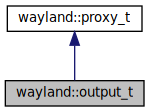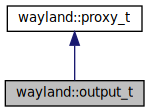compositor output region More...
#include <wayland-client-protocol.hpp>


Public Types | |
| enum | wrapper_type { wrapper_type::standard, wrapper_type::display, wrapper_type::foreign, wrapper_type::proxy_wrapper } |
Public Member Functions | |
| void | release () |
| release the output object More... | |
| bool | can_release () const |
| Check whether the release function is available with the currently bound version of the protocol. More... | |
| std::function< void(int32_t, int32_t, int32_t, int32_t, output_subpixel, std::string, std::string, output_transform)> & | on_geometry () |
| properties of the output More... | |
| std::function< void(output_mode, int32_t, int32_t, int32_t)> & | on_mode () |
| advertise available modes for the output More... | |
| std::function< void()> & | on_done () |
| sent all information about output More... | |
| std::function< void(int32_t)> & | on_scale () |
| output scaling properties More... | |
| uint32_t | get_id () const |
| Get the id of a proxy object. More... | |
| std::string | get_class () const |
| Get the interface name (class) of a proxy object. More... | |
| uint32_t | get_version () const |
| Get the protocol object version of a proxy object. More... | |
| wrapper_type | get_wrapper_type () const |
| Get the type of a proxy object. More... | |
| void | set_queue (event_queue_t queue) |
| Assign a proxy to an event queue. More... | |
| wl_proxy * | c_ptr () const |
| Get a pointer to the underlying C struct. More... | |
| bool | proxy_has_object () const |
| Check whether this wrapper actually wraps an object. More... | |
| operator bool () const | |
| Check whether this wrapper actually wraps an object. More... | |
| bool | operator== (const proxy_t &right) const |
| Check whether two wrappers refer to the same object. More... | |
| bool | operator!= (const proxy_t &right) const |
| Check whether two wrappers refer to different objects. More... | |
| void | proxy_release () |
| Release the wrapped object (if any), making this an empty wrapper. More... | |
Static Public Attributes | |
| static constexpr std::uint32_t | release_since_version = 3 |
| Minimum protocol version required for the release function. More... | |
Detailed Description
compositor output region
An output describes part of the compositor geometry. The compositor works in the 'compositor coordinate system' and an output corresponds to a rectangular area in that space that is actually visible. This typically corresponds to a monitor that displays part of the compositor space. This object is published as global during start up, or when a monitor is hotplugged.
Definition at line 3250 of file wayland-client-protocol.hpp.
Member Enumeration Documentation
◆ wrapper_type
|
stronginherited |
Underlying wl_proxy type and properties of a proxy_t that affect construction, destruction, and event handling
| Enumerator | |
|---|---|
| standard | C pointer is a standard type compatible with wl_proxy*. Events are dispatched and it is destructed when the proxy_t is destructed. User data is set. |
| display | C pointer is a wl_display*. No events are dispatched, wl_display_disconnect is called when the proxy_t is destructed. User data is set. |
| foreign | C pointer is a standard type compatible with wl_proxy*, but another library owns it and it should not be touched in a way that could affect the operation of the other library. No events are dispatched, wl_proxy_destroy is not called when the proxy_t is destructed, user data is not touched. Consequently, there is no reference counting for the proxy_t. Lifetime of such wrappers should preferably be short to minimize the chance that the owning library decides to destroy the wl_proxy. |
| proxy_wrapper | C pointer is a wl_proxy* that was constructed with wl_proxy_create_wrapper. No events are dispatched, wl_proxy_wrapper_destroy is called when the proxy_t is destroyed. Reference counting is active. A reference to the proxy_t creating this proxy wrapper is held to extend its lifetime until after the proxy wrapper is destroyed. |
Definition at line 105 of file wayland-client.hpp.
Member Function Documentation
◆ c_ptr()
|
inherited |
Get a pointer to the underlying C struct.
- Returns
- The underlying wl_proxy wrapped by this proxy_t if it exists, otherwise an exception is thrown
◆ can_release()
| bool output_t::can_release | ( | ) | const |
Check whether the release function is available with the currently bound version of the protocol.
Definition at line 3253 of file wayland-client-protocol.cpp.
◆ get_class()
|
inherited |
Get the interface name (class) of a proxy object.
- Returns
- The interface name of the object associated with the proxy
◆ get_id()
|
inherited |
◆ get_version()
|
inherited |
Get the protocol object version of a proxy object.
Gets the protocol object version of a proxy object, or 0 if the proxy was created with unversioned API.
A returned value of 0 means that no version information is available, so the caller must make safe assumptions about the object's real version.
display_t will always return version 0.
- Returns
- The protocol object version of the proxy or 0
◆ get_wrapper_type()
|
inlineinherited |
Get the type of a proxy object.
Definition at line 288 of file wayland-client.hpp.
◆ on_done()
| std::function< void()> & output_t::on_done | ( | ) |
sent all information about output
This event is sent after all other properties have been sent after binding to the output object and after any other property changes done after that. This allows changes to the output properties to be seen as atomic, even if they happen via multiple events.
Definition at line 3268 of file wayland-client-protocol.cpp.
◆ on_geometry()
| std::function< void(int32_t, int32_t, int32_t, int32_t, output_subpixel, std::string, std::string, output_transform)> & output_t::on_geometry | ( | ) |
properties of the output
- Parameters
-
x x position within the global compositor space y y position within the global compositor space physical_width width in millimeters of the output physical_height height in millimeters of the output subpixel subpixel orientation of the output make textual description of the manufacturer model textual description of the model transform transform that maps framebuffer to output
The geometry event describes geometric properties of the output. The event is sent when binding to the output object and whenever any of the properties change.
The physical size can be set to zero if it doesn't make sense for this output (e.g. for projectors or virtual outputs).
Note: wl_output only advertises partial information about the output position and identification. Some compositors, for instance those not implementing a desktop-style output layout or those exposing virtual outputs, might fake this information. Instead of using x and y, clients should use xdg_output.logical_position. Instead of using make and model, clients should use xdg_output.name and xdg_output.description.
Definition at line 3258 of file wayland-client-protocol.cpp.
◆ on_mode()
| std::function< void(output_mode, int32_t, int32_t, int32_t)> & output_t::on_mode | ( | ) |
advertise available modes for the output
- Parameters
-
flags bitfield of mode flags width width of the mode in hardware units height height of the mode in hardware units refresh vertical refresh rate in mHz
The mode event describes an available mode for the output.
The event is sent when binding to the output object and there will always be one mode, the current mode. The event is sent again if an output changes mode, for the mode that is now current. In other words, the current mode is always the last mode that was received with the current flag set.
The size of a mode is given in physical hardware units of the output device. This is not necessarily the same as the output size in the global compositor space. For instance, the output may be scaled, as described in wl_output.scale, or transformed, as described in wl_output.transform. Clients willing to retrieve the output size in the global compositor space should use xdg_output.logical_size instead.
The vertical refresh rate can be set to zero if it doesn't make sense for this output (e.g. for virtual outputs).
Clients should not use the refresh rate to schedule frames. Instead, they should use the wl_surface.frame event or the presentation-time protocol.
Note: this information is not always meaningful for all outputs. Some compositors, such as those exposing virtual outputs, might fake the refresh rate or the size.
Definition at line 3263 of file wayland-client-protocol.cpp.
◆ on_scale()
| std::function< void(int32_t)> & output_t::on_scale | ( | ) |
output scaling properties
- Parameters
-
factor scaling factor of output
This event contains scaling geometry information that is not in the geometry event. It may be sent after binding the output object or if the output scale changes later. If it is not sent, the client should assume a scale of 1.
A scale larger than 1 means that the compositor will automatically scale surface buffers by this amount when rendering. This is used for very high resolution displays where applications rendering at the native resolution would be too small to be legible.
It is intended that scaling aware clients track the current output of a surface, and if it is on a scaled output it should use wl_surface.set_buffer_scale with the scale of the output. That way the compositor can avoid scaling the surface, and the client can supply a higher detail image.
Definition at line 3273 of file wayland-client-protocol.cpp.
◆ operator bool()
|
inherited |
Check whether this wrapper actually wraps an object.
- Returns
- true if there is an underlying object, false if this wrapper is empty
◆ operator!=()
|
inherited |
Check whether two wrappers refer to different objects.
◆ operator==()
|
inherited |
Check whether two wrappers refer to the same object.
◆ proxy_has_object()
|
inherited |
Check whether this wrapper actually wraps an object.
- Returns
- true if there is an underlying object, false if this wrapper is empty
◆ proxy_release()
|
inherited |
Release the wrapped object (if any), making this an empty wrapper.
Note that display_t instances cannot be released this way. Attempts to do so are ignored.
- Examples
- foreign_display.cpp.
◆ release()
| void output_t::release | ( | ) |
release the output object
Using this request a client can tell the server that it is not going to use the output object anymore.
Definition at line 3249 of file wayland-client-protocol.cpp.
◆ set_queue()
|
inherited |
Assign a proxy to an event queue.
- Parameters
-
queue The event queue that will handle this proxy
Assign proxy to event queue. Events coming from proxy will be queued in queue instead of the display's main queue.
See also: display_t::dispatch_queue().
- Examples
- proxy_wrapper.cpp.
Member Data Documentation
◆ release_since_version
|
staticconstexpr |
Minimum protocol version required for the release function.
Definition at line 3286 of file wayland-client-protocol.hpp.
The documentation for this class was generated from the following files:
